Related Research Articles
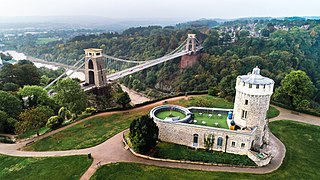
Bristol is a city, unitary authority area and ceremonial county in South West England, the most populous city in the region. Built around the River Avon, it is bordered by the ceremonial counties of Gloucestershire to the north and Somerset to the south. The county is the West of England combined authority area, this includes the Greater Bristol area and nearby places such as Bath.
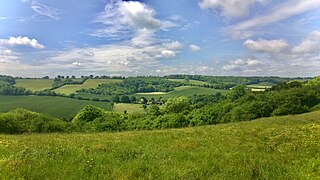
Buckinghamshire, is a ceremonial county in South East England and one of the home counties. It is bordered by Northamptonshire to the north, Bedfordshire to the north-east, Hertfordshire to the east, Greater London to the south-east, Berkshire to the south, and Oxfordshire to the west. The largest settlement is the city of Milton Keynes, and the county town is Aylesbury.
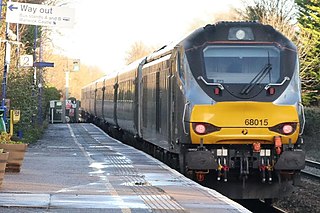
Chiltern Railways is a British train operating company that has operated the Chiltern Railways franchise since July 1996. Since 2009, it has been a subsidiary of Arriva UK Trains.

Aylesbury is the county town of Buckinghamshire, South East England. It is home to the Roald Dahl Children's Gallery and the Waterside Theatre. It is located in central Buckinghamshire, midway between High Wycombe and Milton Keynes.
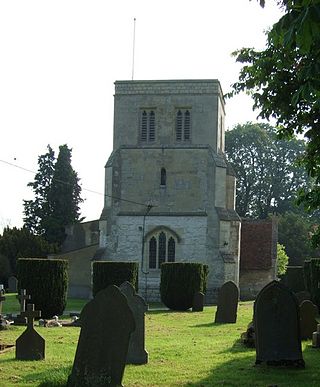
Cheddington is a village and civil parish in the Buckinghamshire district of the ceremonial county of Buckinghamshire, England. The parish has an area of 1,429 acres (578 ha). The village is about 6 miles north-east of Aylesbury and three miles north of Tring in Hertfordshire. The hamlet of Cooks Wharf has grown up where the main road into the village from Pitstone crosses the Grand Union Canal.

Buckinghamshire Railway Centre is a railway museum operated by the Quainton Railway Society Ltd. at Quainton Road railway station, about 5 miles (8.0 km) west of Aylesbury in Buckinghamshire, England. The site is divided into two halves which are joined by two foot-bridges, one of which provides wheelchair access. Each side has a demonstration line with various workshop buildings as well as museum buildings.

Thame is a market town and civil parish in Oxfordshire, about 13 miles (21 km) east of the city of Oxford and 10 miles (16 km) southwest of Aylesbury. It derives its name from the River Thame which flows along the north side of the town and forms part of the county border with Buckinghamshire. The parish includes the hamlet of Moreton south of the town. The 2011 Census recorded the parish's population as 11,561. Thame was founded in the Anglo-Saxon era and was in the kingdom of Wessex.
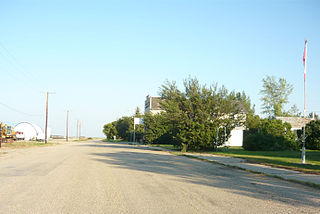
Aylesbury is a village in the Canadian province of Saskatchewan within the Rural Municipality of Craik No. 222 and Census Division No. 7. The village is approximately 60 km north of the City of Moose Jaw.
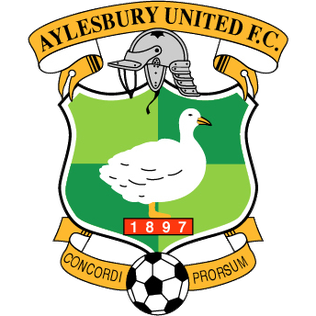
Aylesbury United Football Club is a football club based in Chesham, Buckinghamshire, England. They are currently members of Division One Central of the Southern League and play at Chesham United's Meadow ground, having been evicted from their Buckingham Road ground in 2006. They are nicknamed the Ducks due to the Aylesbury duck.

Fairford Leys is a housing development in Aylesbury, Buckinghamshire, England, designed in the urban village style, with the street and block layout making it more friendly to pedestrians and cyclists. The three main developers of the development were bound by a design code to ensure architectural cohesion and this is maintained through covenants on the deeds of each property.

Aylesbury Vale Parkway railway station is a railway station serving villages northwest of Aylesbury, England. It also serves the Berryfields and Weedon Hill housing developments north of the town. The station and all trains serving it are operated by Chiltern Railways.

The Transport Direct Portal was a distributed Internet-based multi-modal journey planner providing information for travel in England, Wales and Scotland. It was managed by Transport Direct, a division of the Department for Transport. It was launched in 2004 and was operated by a consortium led by Atos and later enhanced to include a cycle journey planning function. The closure of the portal was announced in September 2014 "Closure of the Transport Direct website"(PDF). Archived from the original(PDF) on 12 September 2014. and the portal closed on 30 September 2014.

Cycling is a popular mode of transport and leisure activity within London, the capital city of the United Kingdom. Following a national decline in the 1960s of levels of utility cycling, cycling as a mode of everyday transport within London began a slow regrowth in the 1970s. This continued until the beginning of the 21st century, when levels began to increase significantly—during the period from 2000 to 2012, the number of daily journeys made by bicycle in Greater London doubled to 580,000. The growth in cycling can partly be attributed to the launch in 2010 by Transport for London (TfL) of a cycle hire system throughout the city's centre. By 2013, the scheme was attracting a monthly ridership of approximately 500,000, peaking at a million rides in July of that year. Health impact analyses have shown that London would benefit more from increased cycling and cycling infrastructure than other European cities.

Cycling Action Network (CAN) is a national cycling advocacy group founded in November 1996 in Wellington, New Zealand. They lobby government, local authorities, businesses and the community on behalf of cyclists, for a better cycling environment. It aims to achieve a better cycling environment for cycling as transport. Major initiatives are the annual Cycle Friendly Awards and support for a biennial Cycling Conference. The organisation was originally named Cycling Advocates' Network until 2015.
The NZ Cycling Conference is a series of cycle planning conferences started in 1997 in Hamilton. Since 2001, the conference series has a biennial schedule. The conferences are one of the key ways of exchanging expertise about planning and design for cycling in New Zealand. Starting in 2012, the scope of the conference includes both walking and cycling, by combining the previous Living Streets Aotearoa biennial NZ Walking Conference series, and was rebranded "2WALKandCYCLE". The most recent conference was held in Palmerston North in July–August 2018.

The New Zealand Cycle Friendly Awards were devised by the Cycling Advocates' Network (CAN) in 2003. The purpose of the awards is to acknowledge and celebrate some of the most notable achievements in the country that are helping to promote cycling and to create a cycle-friendly environment. Since 2016, the awards have been jointly organised with the New Zealand Transport Agency and rebranded as the 'Bike to the Future Awards'.
Bicycology is a UK-based collective that was formed after the 2005 London to Scotland G8 Bike Ride. It is a non-hierarchical non-profit organisation which aims to promote cycling as part of a wider focus on social and environmental sustainability. Bicycology has received funding from Artists Project Earth and is a member organisation of the World Carfree Network.
Cycling England was an independent body funded by the Department for Transport to promote cycling in England. It was founded in 2005 to replace the National Cycling Strategy Board. Following the 2010 Comprehensive Spending review it was earmarked for abolition, to be replaced by Local Sustainability Travel Funds and new ways of supporting cycling. Cycling England ceased to exist as a public body on 1 April 2011.
The 2010–11 season was the 108th in the history of the Southern League, which is an English football competition featuring semi-professional and amateur clubs from the South West, South Central and Midlands of England and South Wales.
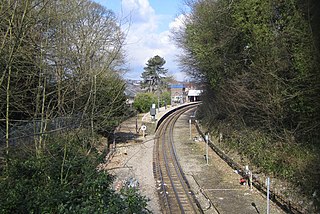
The Chesham branch is a single-track railway branch line in Buckinghamshire, England, owned and operated by the London Underground. It runs from a junction at Chalfont & Latimer station on the Metropolitan line for 3.89 miles (6.26 km) northwest to Chesham. The line was built as part of Edward Watkin's scheme to turn his Metropolitan Railway (MR) into a direct rail route between London and Manchester, and it was envisaged initially that a station outside Chesham would be an intermediate stop on a through route running north to connect with the London and North Western Railway (LNWR). Deteriorating relations between the MR and LNWR led to the MR instead expanding to the northwest via Aylesbury, and the scheme to connect with the LNWR was abandoned. By this time much of the land needed for the section of line as far as Chesham had been bought. As Chesham was at the time the only significant town near the MR's new route, it was decided to build the route only as far as Chesham, and to complete the connection with the LNWR at a future date if it proved desirable. Local residents were unhappy at the proposed station site outside Chesham, and a public subscription raised the necessary additional funds to extend the railway into the centre of the town. The Chesham branch opened in 1889.
References
- 1 2 "Cycling City, Cycling Towns". Department for Transport. Archived from the original on 19 May 2009. Retrieved 7 July 2009.
- ↑ Simon MacMichael (12 February 2012). "DfT publishes final assessment of Cycling City and Towns initiative - in 17 separate reports". road.cc. Retrieved 20 February 2016.